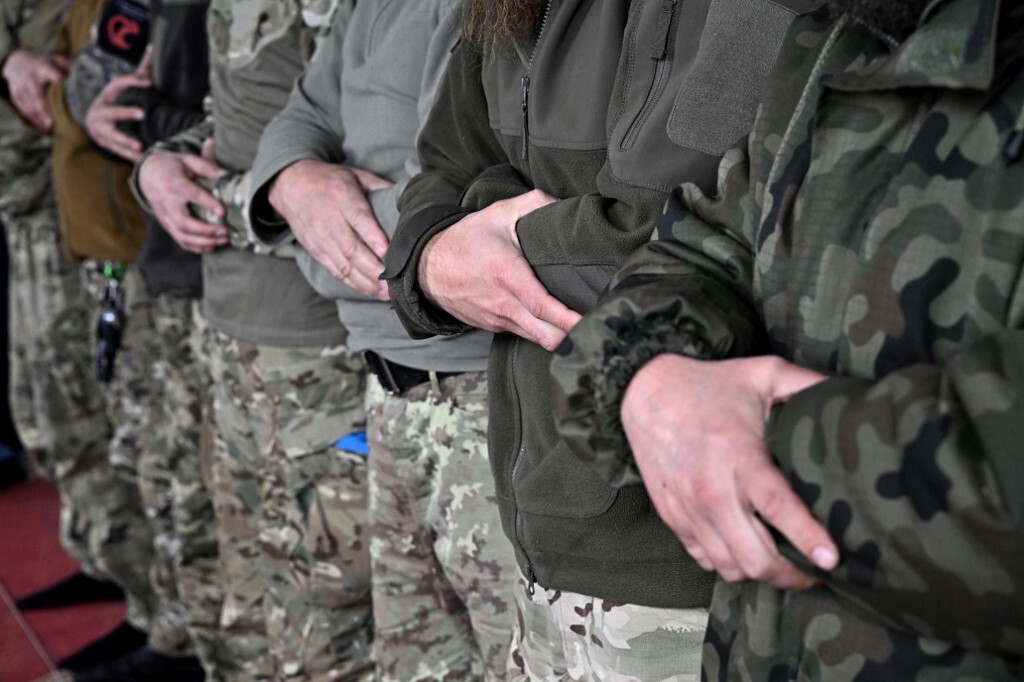Muslims are observing Ramadan in war-ridden Ukraine for a second year, and most people praying at a mosque near the eastern front line this week were soldiers in camouflage fatigues.
"I ask Allah to protect our mosque. I ask Allah to protect Ukraine... and to punish tyrants," Mullah Murat Suleymanov said in prayers for the holy month.
JOIN US ON TELEGRAM
Follow our coverage of the war on the @Kyivpost_official.
"Ramadan is a month of victory," he told the small congregation of 16 people, 11 of them in uniform including one woman.
The mosque has numerous boarded-up broken windows and walls pitted by shrapnel. A rocket exploded nearby two days earlier.
Among the worshippers was Said Ismagilov, formerly one of Ukraine's Muslim spiritual leaders.
When the war began, he quit and now works as an ambulance driver with volunteer paramedics, evacuating wounded soldiers from the front line.
Sandy-haired and wearing glasses, 44-year-old Ismagilov is a Tatar, a Muslim ethnic group.
He wore a sleeve patch from his ASAP Rescue battalion and showed his ambulance parked outside, with taped-over dents caused by shrapnel.
- 'Allah's protection' -
He said he feels "Allah's will and protection" amid the danger.
"There were times when my ambulance got riddled with shrapnel. Thank God, I wasn't injured."
When the war broke out, he had been serving as mufti of Ukraine's Umma religious administration for 13 years.
But the mosque where he served emptied as many evacuated the area.
"I realized I was useless," he said, opting to "stand up and defend my motherland".

What Did Donald Trump Say About Ukraine in His Big Speech to Congress?
"Now I evacuate wounded people."
Last year he spent Ramadan in Lysychansk, a city that saw extremely heavy shelling before Ukraine's military eventually withdrew.
One of the most important Muslim festivals, Ramadan requires believers to abstain from food and water from dawn to nightfall for a month.
Despite his wartime job, Ismagilov said he can still observe the Ramadan fasting rules.
"I'd got used to spending Ramadan at war, so this year was nothing new to me," Ismagilov said.
"I have all I need for fasting according to all Muslim traditions."

This photograph taken on March 31, 2023, shows worshippers performing the Friday prayers at a mosque near the eastern front line, amid the Russian invasion of Ukraine. Muslims are observing Ramadan at war in Ukraine for a second year, and most people praying at a mosque near the eastern front line on the first week of Ramadan were soldiers in camouflage.Genya SAVILOV / AFP
"I'm not in the trench now. I spend most of my daytime driving or at the stabilization point," a building where paramedics take wounded for initial medical care, he said.
He also tries to fit in a couple of hours praying at night.
- 'Hard to be Muslim' -
"It's hard for those Muslims who have to stay in the trenches. They are cold and there is a lot of water in the trenches as it often rains... It's hard to be a Muslim there," he said.
Ismagilov said he did not know how he would celebrate the end of Ramadan, Eid Al Fitr, later this month.
"You are lucky if you can visit a mosque now and you never know how many people will come, or if they will come," he said.
"If there is heavy shelling, we will probably gather in a basement to pray there."
Ismagilov grew up in the city of Donetsk in eastern Ukraine.
Intrigued by his family's Muslim heritage -- which his parents knew little about -- he went to study theology at an Islamic university in Moscow and later became an imam in Donetsk.
While he grew up in a largely Russian-speaking region, he now prefers to speak Ukrainian.
"I think it's disgusting when Russian Muslims support the war", he said.
Russia treats its ethnic minorities, many of them Muslims, as "people of low quality" and "uses them as cannon fodder" in the war, he said.
"It's no secret that most of the dead enemy soldiers are ethnically from Buryatia, Tuva, Dagestan, Tatarstan, Chechnya," he said, naming Russian regions with large numbers of Muslims and Buddhists.
"I'm absolutely sure that many Muslim fighters taking part in combat would like to fast... because in this case they feel even better with Allah's help," the Mufti Suleymanov told AFP.
Dressed in long robes and a white hat, he was elected mufti last November, replacing Ismagilov.
A soldier standing outside the mosque said he was fasting and that most Muslim soldiers do, unless they are on combat missions.
"When you are going right to the very front line, it's permitted not to fast. If it's not hot and you're not tormented with thirst, then you can fast," he said.
You can also highlight the text and press Ctrl + Enter











